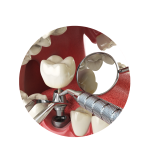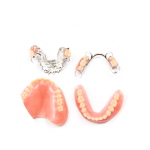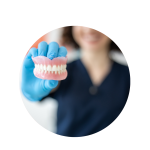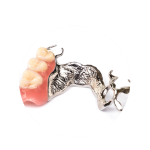Dentures vs Dental Implants – The Best Fake Teeth?
When it comes to replacing missing teeth, two common options dentures (dental prosthetics) and dental implants. Both options have their own advantages and disadvantages, and the choice between them depends on various factors such as the patient’s oral health, budget, personal preferences, and the recommendation of their dentist. In this blog post, we will explore the differences between fake teeth and dental implants to help you make an informed decision.
Dental implants are a permanent solution for replacing missing teeth. They consist of a titanium post that is surgically inserted into the jawbone, acting as an artificial tooth root. A crown or bridge is then attached to the implant, providing a natural-looking replacement tooth.
Advantages of Dental Implants:
1. Stability: Dental implants are known for their stability and durability. They are securely anchored in the jawbone, providing a strong foundation for chewing and speaking.
2. Bone preservation: Implants stimulate the jawbone, preventing bone loss and preserving the natural facial structure.
3. Longevity: With proper care, dental implants can last a lifetime, making them a cost-effective long-term solution.
Disadvantages of Dental Implants:
1. Cost: Dental implants tend to be more expensive than fake teeth. The initial investment may be higher, but considering their longevity, they can be a worthwhile investment in the long run.
2. Surgical procedure: Getting dental implants involves a surgical procedure that requires sufficient bone density and healthy gums. Some individuals may not be suitable candidates for implants due to underlying oral health issues.
3. Time-consuming process: The process of getting dental implants typically takes several months, as it involves multiple stages such as implant placement, healing period, and crown placement.




Dentures are removable dental prosthetics that are designed to replace missing teeth. They can be either full dentures, which replace all the teeth in the upper or lower jaw, or partial dentures, which replace only a few missing teeth. Fake teeth are typically made from acrylic or a combination of acrylic and metal.
Advantages of Dentures.
1. Cost: Dentures are generally more affordable than dental implants, making them a popular choice for individuals on a tight budget.
2. Non-invasive: The process of getting Dentures does not require any surgery or invasive procedures. It is a relatively simple and non-invasive treatment option.
3. Reversibility: Since Dentures are removable, they offer the advantage of being reversible. If a patient is not satisfied with their dentures or wants to explore other options in the future, they can easily switch to a different treatment without any major complications.
Disadvantages of Dentures.
1. Stability: Dentures may not provide the same level of stability as dental implants. They can sometimes slip or move while eating or speaking, causing discomfort and affecting speech.
2. Bone loss: Unlike dental implants, dentures do not stimulate the underlying jawbone. Over time, this can lead to bone loss and changes in facial structure.
3. Maintenance: dentures require regular cleaning and maintenance to prevent oral health issues such as gum disease and bad breath. They need to be removed and cleaned properly after meals.




In conclusion, both dentures and dental implants have their own advantages and disadvantages. Dentures are more affordable, non-invasive, and reversible, but they may lack stability and contribute to bone loss over time. On the other hand, dental implants offer superior stability, preserve bone health, and have a longer lifespan but require a surgical procedure and come with a higher cost.
It is crucial to consult with a qualified dentist or prosthodontist who can evaluate your specific oral health needs and provide personalized recommendations based on your circumstances. They will consider factors such as your overall oral health, bone density, budget, and personal preferences to help you make an informed decision.
